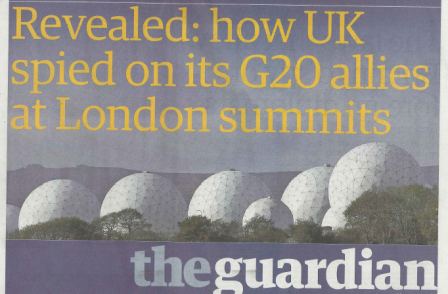
Prime Minister David Cameron appeared to show a lack of understanding when he threatened The Guardian with a 'D Notice' yesterday over its continuing revelations about the US and UK security services.
Cameron said:
The approach we have taken is to try to talk to the press and explain how damaging some of these things can be and that is why The Guardian did actually destroy some of the information and discs that they have but they've now gone on and printed further material which is damaging.
I don't want to have to use injunctions or D notices or the other tougher measures. I think it's much better to appeal to newspapers' sense of social responsibility.
My understanding is that the DA-Notice system, as it is now called, is a voluntary one.
The Guardian has already broken DA-Notices with its reporting and has not faced any censure because there is none.
DA Notice 5 asks editors not to report on:
specific covert operations, sources and methods of the Security Service, SIS and GCHQ, Defence Intelligence Units, Special Forces and those involved with them, the application of those methods, including the interception of communications, and their targets; the same applies to those engaged on counter-terrorist operations."
It was felt that The Guardian's reporting in June this year of spying at the G20 conference in 2009 breached this (particularly the detail about methods used).
The DA Notice Committee claims to offer a confidential advice service to editors to enable them to make informed decisions about the harm that could be done when it comes to making revelations about the security services. It says on its website: "The Notices have no legal standing and advice offered within their framework may be accepted or rejected in whole or in part."
The use of injunctions could be open to Cameron, but it would require The Guardian to give the Government prior notice about what it is going to report on in future. And that is something which it is now extremely unlikely to do.
He also may have made it less likely that The Guardian will seek advice from other official sources before publishing, for fear that it could set the hare running on an injunction application. So all in all I suspect Cameron's bluster from yesterday will have precisely the opposite effect of that intended.
The Guardian is part of the DA-Notice system, via its membership of the Newspaper Publishers Association, indeed editor Alan Rusbridger and others attended a seminar run at The Guardian offices by DA Notice committee secretary Andrew Vallance last month.
Vallance stressed to Press Gazette today that any conversation he has with a journalist prior to publiction of a story is strictly confidential between the two parties. The only exception, he said, was if a publication chooses to ignore his advice and he fears that there could a risk to life as a result.
Email pged@pressgazette.co.uk to point out mistakes, provide story tips or send in a letter for publication on our "Letters Page" blog
